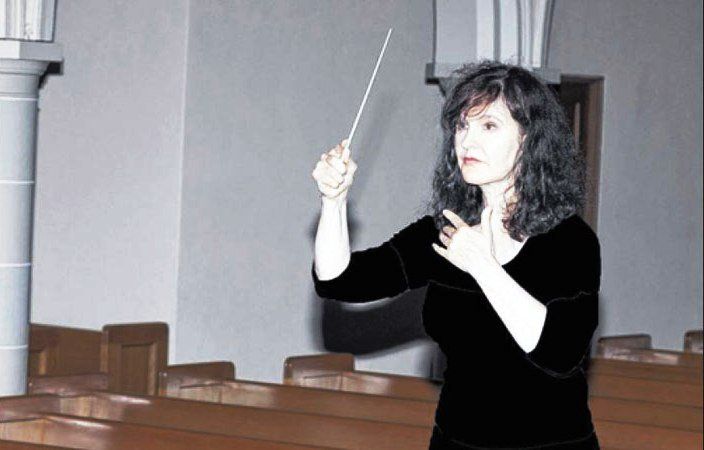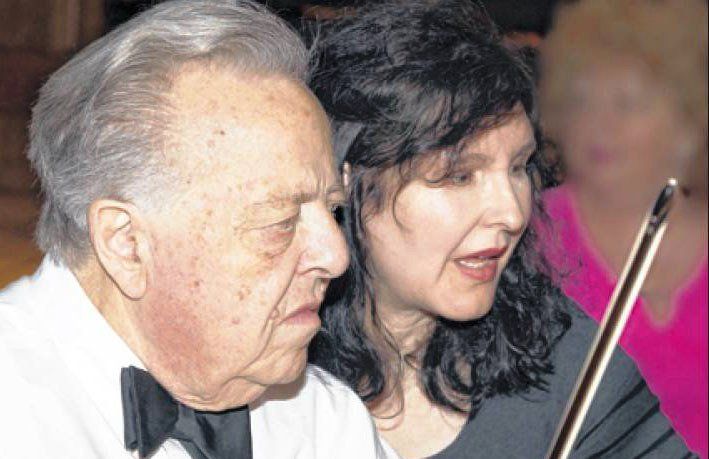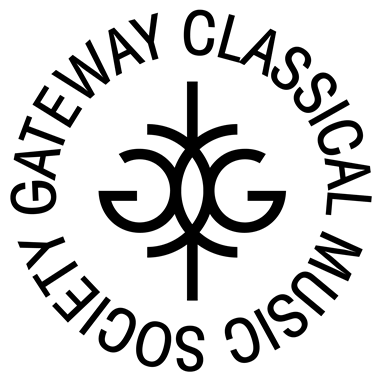Gateway Classical Music Society,
Gateway Classical Music Society of New York and the New York Grand Opera are 501(c)(3) not-for-profit corporations.
All contributions are tax deductible as allowable by law.

Greenwich Time Article
TIME OUT: WITH IDA ANGLAND
Leading Lady
Conductor makes her mark in field dominated by men
By Barbara Perry Bind
Photo Credit - Katheen Di Giovanna/For Greenwich Time
Maestro Ida Angland conducts the Gateway Orchestra during a sound check rehearsal prior to a recent performance of Beethoven’s Eroica Symphony, Tchaikovsky’s Violin Concerto and two other shorter works.
Photo Credit - Katheen Di Giovanna/For Greenwich Time
Ida Angland, one of the founders of Greenwich’s Gateway Classical Musical Society and the artistic director and conductor of the Gateway Orchestra, goes over a piece with Gino Sambuco, concert master. Sambuco played first violin for 36 years with the N.Y. Philharmonic.
Greenwich resident Ida Angland began playing piano at 3 years old as a little girl in North Carolina. By the age of 12, she was named one of the "most promising talents" in her home state. She studied voice and performed as a soprano with regional opera companies. But it wasn't until she picked up a baton that she realized her true musical passion -- conducting. It is a gift that comes naturally to her, and she often uses no music or podium, conducting from memory. Ten years ago, she was one of the founders of Greenwich's Gateway Classical Musical Society, where she is artistic director and serves as conductor of Gateway Orchestra. We took a Time Out with Angland to find out more about the skills it takes to lead an orchestra and what it means to be a female conductor.
Q: What skills does a conductor need?
A:
A conductor must have three basic abilities: 1) an excellent ear, to listen for correct harmonies, pitches, correct notes, to be able to differentiate and simultaneously hear separate melodies and counterpoints and to be able to correct inaccuracies, to be able to judge balance between thematic and counter-subject material, as well as the degree of volume needed for achieving the best environmental balance) 2) an excellent sense of rhythm - the natural ability to feel the pulse of the beat) which also includes an excellent sense of timing; the ability to sense when and how much to slow down or speed up the tempo, and
3) an effective way to physically impart the intent of the music so the musicians can understand what to do; this is different with every conductor and is as individual as handwriting.
Apart from the first two of these basic skills, which are essentially innate, and without which it is impossible, in my opinion, to become an effective conductor, it helps to have a great desire to learn as much as possible about music; e.g., to have intellectual curiosity and actively pursue knowledge that relates to the understanding of music.
In addition to collecting as much knowledge and understanding of the score as possible, it is very helpful to be able to sense the climate of a rehearsal and to be creative in instantly thinking of ways to inspire the forces at one’s disposal by executing spur-of-the-moment devices to get, for example, a tired- looking group of musicians in the mood to make music and to get them to invest energy in cooperating to achieve this goal.
Rehearsal climates constantly vary, so having this ability helps one be more effective as a conductor. However, one can have vast musical knowledge and rehearsal tricks galore, but without an excellent ear and sense of rhythm, conducting effectively is not possible. This is why I agree with David Robertson (conductor of the St. Louis Symphony), who says conducting cannot really be taught. It involves a collection of basic and other intangible abilities that can’t really be learned. Various gestures can be explored, and it’s always nice to have more gesture tricks in one’s repertoire.
But in the end, gestures all look very individual. Basically, they should feel natural and have relevance only to the intent of the music.
This, in my opinion, makes them more effective than seeking to “look” a certain way, which I think a lot of conductors mistakenly do.
Q: Orchestra conducting traditionally has been a male-dominated field. Have you faced any obstacles as a female conductor?
A: Ultimately, I feel competence and a track record of steady accomplishment are the best barometers for the validation of one’s ability; however, while there is nothing tangible I can point towards, I have feelings from time to time that being a woman conductor brings with it certain perceptions I believe can be limiting.
I think the world generally associates authority with masculinity . . .a strong deep voice . . . a more imposing physique . . . etc. Conducting an orchestra involves a lot of authority and many other constantly changing variables ranging from those within the music itself to dealing with many different personalities and handling many types of negotiations as well. While one can win over the musicians with competence, it’s more difficult to fight long standing perceptions by boards of directors and artists’ management that women just don’t seem authoritative enough and therefore must be better at conducting children’s choirs and less demanding or less complex repertoire, as examples. Women conductors may therefore be pigeonholed based upon these long standing biases and deductions. It’s perhaps more comfortable and certainly more conventional for people making decisions about whom to hire to believe in what may be perceived as authority rather than what may be an equally attractive or more effective, but less conventional, alternative. At least that is my explanation to explain feelings I at times think seem to have some basis in fact.
Q: Describe your role as conductor and artistic director at Gateway.
A: As conductor of the orchestra, I contract the musicians, rehearse them in preparation for the performances, meet with them to discuss artistic, personnel, strategic and other relevant issues. When chorus is needed for a work, I select choristers, section leaders, hire rehearsal pianists, conduct preparatory rehearsals and orchestra rehearsals. As artistic director, I make all decisions on repertoire, artists, venues, and many other production-related matters. I audition instrumental and vocal soloists for major concerti and for leading and subordinate roles in opera and select to perform with Gateway those who have outstanding talent, and whom I either believe can benefit from more public exposure and experience or, who are already so outstanding that it is absurd they don’t already have a major career and the public should be made aware of their existence. I decide what Gateway’s objectives will be and how they can best support its mission to promote classical music and artists and to reach out to more audiences. I gather committees for the planning and execution of events that will bring in funds to make it possible to produce our performances. This year, on Oct. 5 Greenwich residents Arlene and Reuben Mark will host a tenth anniversary benefit event for Gateway. Our benefit events have been hosted principally in New York City and Greenwich.. I also form other committees for other types of fundraising.
Q: What is the favorite part of your job?
A: I love working with the musicians, rehearsing a program with the orchestra and performing it with them. I love working with the soloists and hearing new ones. Basically, I love almost all music related aspects of the job. There are numerous fundraising and administrative tasks that I and various volunteers must do before any music is possible. These I would not classify as fun or anyone’s favorite part of the job. Music is the icing on the cake, but the cake has to be there and fully baked before there can be any icing, and that is a lot of constant work. But with any worthwhile endeavor, hard work is always necessary to achieve a desired goal.
Q: Do you even see it as a job?
A: It is a huge job and big responsibility to gather the best artists at your disposal and to do a great work of art justice, often with limited rehearsal, less than ideal rehearsal spaces and a whole host of other challenges. However, I think as long as the main focus and drive is the best possible musical outcome and recognizing that you and other artists are humble servants of art and nothing more, almost any hurdle is possible because that attitude is a reminder that we are all a small, but wonderful part of something much bigger than ourselves... perpetuating the work in its entirety, an indelible mark of human achievement. And for music, an art form within a limited space of time, live performance is essential to keeping its significance and greatness alive.
Q: What is your musical background, and how long have you been a musician?
A: I first showed musical ability at age 3 when my mother discovered me playing a piano piece by ear that my 11-year-old cousin was learning. She thought it was the cousin who was playing the piece. At age 12, I was given the first “Superior Plus” rating ever handed down by the National Federation of Music Clubs piano contest that year. Later in the year, I was the youngest of 4 children chosen by the NFMC as one of the state’s most promising talents. We each performed on a piano recital at the University of North Carolina that year. When I was 16, I attended the Governor’s School, which was a school for artistically gifted teenagers. Then, through competitive audition, I was selected to attend the North Carolina School of the Arts (now renamed the University of North Carolina School of the Arts), where I received my formative music training. I attended Peabody Conservatory in voice and piano and studied voice and opera with renowned teachers at Indiana University, Peabody Conservatory and elsewhere. I sang in regional opera companies as a soprano and was a featured soloist at the Metropolitan Museum of Art and on the Robert Sherman Show, WQXR.
Q: How did you decide to become a conductor?
A: It was sort of by accident. I had moved to Connecticut and was busy with my family and raising our three sons; however, to keep myself doing at least something in music, I used to sing on vocal chamber music recitals. The clarinetist with whom I performed asked me to sing on his faculty recital at Juilliard, which I did. Afterwards, I was telling him I was thinking of taking an orchestral conducting course at a college in Connecticut as an adjunct to my musical interests. He advised me to take one at Juilliard instead. I phoned to sign up, but the course was already full. I was advised to phone the conductor to ask if he would allow another student. I met with him for an interview the next day, played the Chopin Fantasy Impromptu for him on the piano and told him a little about my singing background as well. He let me come into the class. After six months, he (Maestro Vincent La Selva) took me aside and told me he thought I had outstanding talent as a conductor and invited me to be an apprentice conductor with the New York Grand Opera, a well -respected opera company of 30-plus years that performed fully staged operas in Central Park and concerts of symphonies and operas in Carnegie Hall. I took him up on this wonderful musical offer and became chorus master and assistant conductor the next year. I organized choruses from Connecticut to participate with the NYGO in concerts at Carnegie Hall and eventually decided, with the constant encouragement and urging of the musicians and choristers with whom I worked, to go out on my own, so together we started Gateway and our inaugural performance was with Aida at the First Congregational Church of Greenwich in Old Greenwich on Verdi’s birthday, Oct. 10 in 2004. The New York City debut was with Aida as well, followed by Carmen, Rigoletto, the Beethoven Ninth Symphony, the Verdi Requiem and many other operatic, choral and symphonic masterworks.
Q: Do you find any section of the orchestra more difficult to lead/relate to than another?
A: Actually, this can vary from section to section on any given day. Sometimes the woodwinds may be inclined to drag the tempo, other times the strings ... sometimes the timpanist is too timid or too strong, sometimes the brass is too loud and does not play certain motives sensitively enough. These things always vary and underscore the chameleon-like nature of one’s job as conductor -this color today, that tomorrow, depending upon so many different factors.
Q: Why and when did you found Gateway?
A: Gateway was founded 10 years ago in 2004. The board of directors, musicians, choristers, soloists and supporters all contributed to founding Gateway. Greenwich resident and philanthropist Joan War-burg was one of Gateway’s founding leadership supporters and Board members. Her encouragement and belief in my talent, and in the talents of women in general, was an inspiration to me and huge factor to Gateway’s success. Basically, I wanted to found Gateway because I knew I wanted to conduct larger works that are overwhelming conducted by male conductors. I love the emotion, depth and excitement of this repertoire and I knew I would stand a much better chance of conducting it by having more power over artistic decisions. This is what many male conductors have done. They have built a power platform from which to rule. I do believe it is harder for us as women to do that because we are often conflicted and make apologies for our decisions because society has reinforced the notion that women need to be liked and loved and not feared or disliked. The reality is that all leaders are both loved and disliked. This fact I do believe is easier for men to accept. I even think men are better able to turn negativity into a game of sorts and deal with it more effectively. However, I think women’s natural leadership style can be more understanding and empathetic which helps to foster loyalty and cohesiveness. In short, both sexes can learn from each other but one style need not be more effective than another, and women should no longer be held back because of perceptions that one way, just because it may be more conventional, is the best or right way.
Q: What is the orchestra’s size?
A: The size is around 70 musicians, give or take a few depending upon score requirements for a particular work. Larger works have been as high as 80 or a few more and sometimes include as many as 80 or 90 choristers as well.
Q: Where do you perform?
A: In the past 10 years, we have performed in New York City, Greenwich and Stamford and are now including Harlem, Scarsdale and Ridgewood, N.J.
Q: How many performances do you have a year?
A: We vary between one and three productions a year, normally with at least 2 performances of each production. This year we are doing 5 performances of this production.
Q: What is your favorite piece of music?
A: The favorite is almost always the one I’m working on at the time. There are just so many I love, it’s really hard to say.
Gateway Classical Music Society,
Gateway Classical Music Society of New York
and the New York Grand Opera
are 501(c)(3) not-for-profit corporations.
All contributions are tax deductible as allowable by law.




